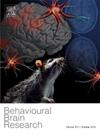miR-124 mediates the effects of gut microbial dysbiosis on brain function in chronic stressed mice
Abstract
The gut microbiota plays a key role in the brain function impairment caused by chronic stress, yet its exact mechanism remains unclear. Many studies have revealed the important role of miR-124 in the central nervous system. Meanwhile, previous studies have indicated that miR-124 may be regulated by chronic stress and gut microbiota. Here, we aimed to explore whether miR-124 serves as a mediator for the impacts of gut microbial dysbiosis on brain function in mice subjected to chronic stress. Repeated daily restraint stress for 4 weeks was used to induce chronic stress in mice. Chronic stress resulted in gut microbial dysbiosis, abnormal behaviors, and a decrease in hippocampal miR-124 levels. Treatment with different probiotic mixtures significantly alleviated the effects of chronic stress on hippocampal miR-124 levels and mouse behaviors. Suppression of hippocampal miR-124 expression reversed the beneficial effects of probiotics on cognitive function, neurogenesis, and related molecular markers in chronically stressed mice. Bioinformatics analysis and qPCR suggested that Ptpn11 might be a target gene for miR-124 in mediating the effects of gut microbial dysbiosis on brain function in these mice. These findings suggest that miR-124 is a pivotal regulator that mediates the detrimental effects of gut microbial dysbiosis on brain function and the subsequent cognitive impairment during chronic stress.

 求助内容:
求助内容: 应助结果提醒方式:
应助结果提醒方式:


